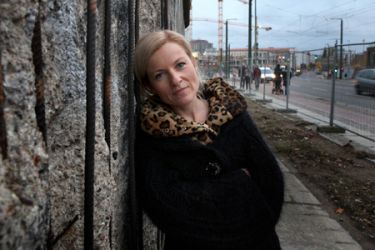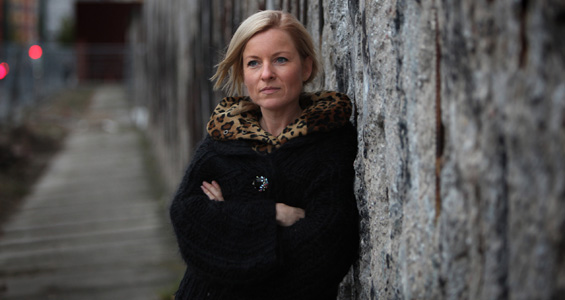‘I left my family for my freedom’
When she left the East, Arlette Riedel had to promise never to contact her family again.

 |
| Arlette Riedel stands beside a remaining stretch of the Berlin Wall [Credit: Penny Bradfield] |
Many events, large and small, in the East and the West, helped to bring the Cold War to a peaceful end.
But it is the events of November 9, 1989, that the world remembers.
The 154km of reinforced concrete and barbed wire, enclosing half a city, came to symbolise a government that could not trust its own people.
For the second time in the 20th century Berlin hosted the last battle in a global war. But this time, instead of laying in ruins, it stood unscathed. Rather than clearing rubble and building from scratch, Germany became a whole country again in less than a year.
Al Jazeera spoke to people who are witnesses to that period, their lives shaped by the political divide that dominated the second half of the 20th century. In turn, they helped to shape those events that the world celebrates on Monday, November 9, 2009.
| Special report |
|
|
For most Berliners, the night of November 9, 1989, was cause for uproarious celebration as millions of people got their freedom. But for Arlette Riedel, the night was laced with bitter irony.
Just seven days before change swept across East Germany like a wave, Riedel had won her freedom – after a long fight and at great personal cost. Her story shows how the paranoia and vindictiveness of the East German regime wreaked havoc on families and relationships.
At 18, Riedel made a Faustian pact to be with the volatile man she loved. Newly married, she was given permission to leave East Berlin and move to the West to be with her new husband on November 2. In return, she was forced to to sign papers promising to break contact with her family and friends.
And even as the Berlin Wall fell, Riedel’s new marriage was crumbling.
Escape
The story began in 1988, when Riedel took a canoeing holiday on a lake outside Berlin with her boyfriend of three months, Tobias. He told her that he and a friend were planning to escape through Communist Hungary to Austria.
“He was a fierce guy,” she recalls. “He’d been very disappointed with life in the GDR.”
He promised they would stay together and that she could join him once he was a West German citizen. But things did not go to plan.
“After about three weeks, we got the news that the police had caught him at the border.”
Tobias wound up in a prison in East Berlin, where Riedel visited him regularly and wrote almost daily.
“There was one time I’ll never forget,” she says. “[Tobias] told me, ‘Go and stand on the football pitch outside the jail and you can see my cell’. So I went to the football pitch and looked and he was reaching his arms through the bars, waving and calling out, ‘I love you’.
“Then arms came through the bars of all these other cells and there were all these prisoners waving. Me and Tobias’ parents just started crying. There were so many young people in there, locked up because they wanted to be free.”
‘Bought’ by the West
In April, 1989, Tobias and other prisoners were ‘bought’ by the West German Government – a common practise at that time.
He settled in West Berlin; the couple began making plans to marry and for Riedel to move to the West. But there was a price to pay.
“I had to give a signed piece of paper to my family saying I would break off contact with them. My parents were crying, saying, ‘Are you really going to do this?’
“To me it was just a piece of paper. I said, ‘Come on, do you really think after everything I’ve seen, that I can go on living in a society like this?’ So I made the contract with the government. I was 18 and I was so old for my age.”
Riedel’s plans to leave the East began to take their toll. She was victimised by her superiors at Interflug, the GDR’s national airline where she was a trainee flight attendant. Relations within her family had become poisonous.
When Riedel and Tobias were married in East Berlin on September 29, neither Arlette’s father nor sister came to the wedding.
Behind the wall
Finally, when the date of departure to the West arrived, her mother and Tobias’ mother took her to Tränenpalast (‘Palace of tears’), the border crossing where people travelling to the West said their goodbyes to their loved ones.
“I packed a little suitcase. It wasn’t much. I remember sitting there for about 50 minutes at passport control. I was so curious about what was behind that wall.”
One more week and she would have found out the easier way. When the wall fell, Arlette’s delight at the crumbling of the regime that had made her life so difficult was tempered by the feeling that life had been unfair.
“Of course I was happy for the people. It was a great moment. But I was so angry as well. I thought, ‘This is a joke. All that trouble for nothing. What kind of lucky person am I?’
“I’d said goodbye to my family and friends. So I couldn’t really celebrate.”
The bitterness was deepened by the fact that, from the start, it was clear that the marriage was not going to work. Tobias was already involved with other women. The marriage was to last just one more month.
“I was 18 years old, no money, no job. And I was alone. I had no friends anymore. When I saw them, they said, ‘You left us’.”
After a few months she got a job with Lufthansa and began teaching herself English at night. Gradually she pulled herself up by sheer hard work. She travelled, got back on her feet, and slowly repaired her relationships with her father and sister, but it was a long and difficult journey.
“It took 10 years to be happy, to let the hate go away. I hated that people always asked whether I was from the East or the West.”
“If I said I was from the East, people would assume I was vulgar and uneducated. So I changed the way I spoke; I lost all the GDR slang. I did not want to talk about where I was from. I just wanted to be seen as a normal person.”
